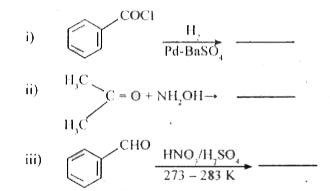Complete Solutions to PART -D of chapter SOLVED PAPER II PUC TOPPER'S ANSWER MARCH-2015 of Class 12 book with complete answers and questions
| Class 12 | CHEMISTRY |
| Chapter | SOLVED PAPER II PUC TOPPER'S ANSWER MARCH-2015 |
| OSWAAL PUBLICATION | PART -D |
| Number Of Questions | 30 |
| Academic Year | 2023-24 |
Caleulate the packing efficiency in a unit cell of Cubic Close Packing(CCP) structure.
View SolutionName the crystal defect which lowers the density in an ionic crystal
View SolutionA solution containing 18g of non - volatile non - electrolyte solute is dissolved in 200g of water freezes at 272.07K. Calculate the molecular mass of solute. Given `K_(f)=1.86kg//mol` and freezing point of water = 273K
View SolutionDefine isotonic solution. What happens when the blood cell is dipped in a solution containing more than normal saline concentration?
View SolutionCalculate the EMF of the cell for the reaction.
`Mg_((s))+2Ag_((aq))^+ Mg_((aq))^++2Ag(s)`
Given: `E^@ Mg^(2+)//Mg=-2.37 V`
`E^@ Ag^(+)//Ag=0.08V`
`[Mg^(2+)]=0.001M,[Ag^+]=0.0001M`
`log 10^5=5`
View SolutionWhat are fuel cells ?
View SolutionDerive an intergrated rate for the first order reaction.
View SolutionAccording to collision theory, what are the two factors that lead to effective collisions
View SolutionWrite any two differences between physisorption and chemisorption.
View SolutionName the phenomenon/effect for the following :
Colloidal particles are in zig-zag motion
View SolutionName the phenomenon/effect for the following :
When an electrical potential is applied across two platinum electrodes dipping in colloidal solution, particles moves towards one or the other electrodes
View SolutionName the phenomenon/effect for the following :
Scattering of light by colloidal sol
View SolutionWrite equations for the steps in `SN^1` mechanism of the conversion of tert.butyl bromide into tert.butyl alcohol.
View SolutionIdentify the products A, B and C in the following equation.
`CH_(3)OH overset("Red P")underset(Cl_(2))rarr A overset("Nal")underset("acetone")rarr B overset(C_(6)H_(5)I)underset("Na and dry ether")rarrC`
View SolutionWrite the mechanism of acid catalysed dehydration of ethanol to ethene.
View SolutionExplain Williamson's reaction. Write the general equation.
View SolutionWrite the organic compound formed in the following equation .

View SolutionComplete the reaction

View SolutionWrite the organic compound formed in tht following equations
`CH_3-Mg-Br+CO_2overset("dry ether")underset(H_2O^+)to`
View SolutionExplain HVZ (Hell-Volhard-Zelinsky) reaction with equation.
View SolutionIdentify the reactant 'A' in the following reaction
`A+2R-XtoR_4N^+X^-`
View SolutionExplain Hoffmann's bromamide degradation reaction for the preparation of methanamine.
View SolutionWhich is more basic among aqueous solutions of aniline and ammonia ? Give one reason.
View SolutionWrite Haworth structure for maltose.
View SolutionWhat is meant by denaturation of protein ? Which level of structure remains intact during denaturation of globular protein ?
View SolutionName the base present only in DNA but not in RNA.
View SolutionWrite the partial structure of Neoprene
View SolutionWrite the partial structure of
Terylene (Dacron)
View SolutionWrite the partial structure of
Nylon-6
View SolutionExplain the preparation of Buna-N with equation.
View Solution
PART -D questions and complete solutions for chapter SOLVED PAPER II PUC TOPPER'S ANSWER MARCH-2015 of OSWAAL PUBLICATION CHEMISTRY (KANNADA ENGLISH) of Class 12